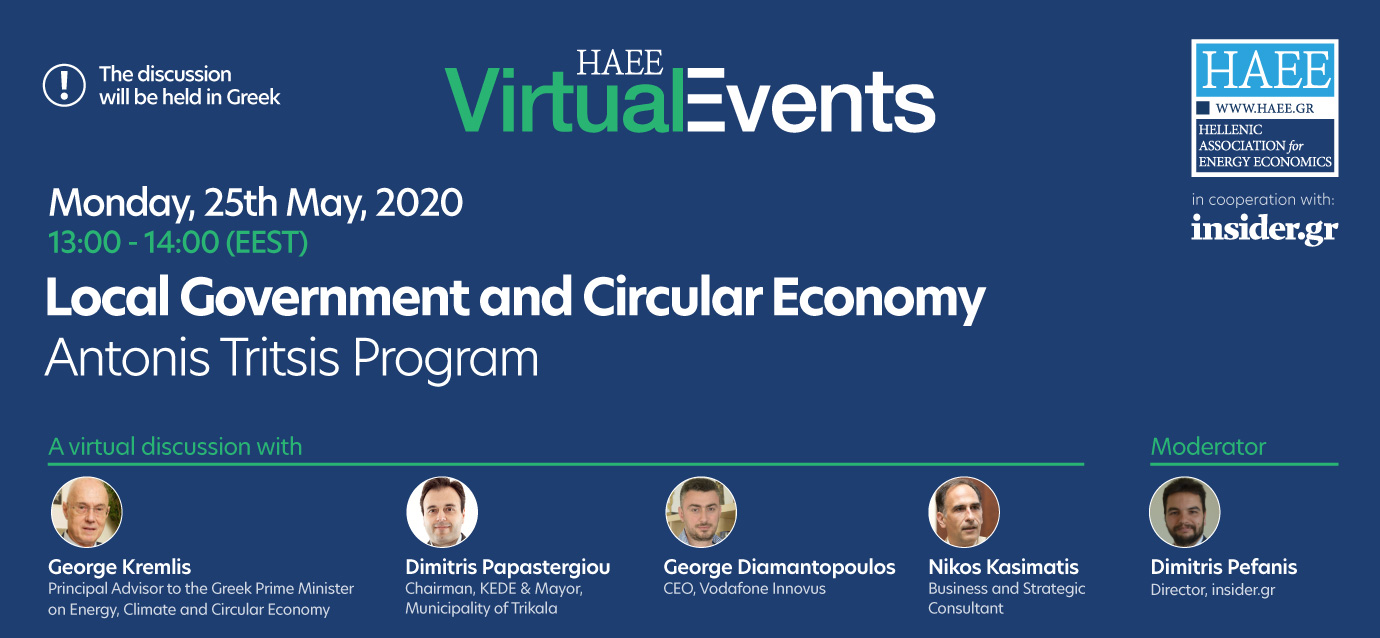Tel: +30 210 92 30 422
E-mail: info@haee.gr
Address
62, Charilaou Trikoupi Str.
Kifissia, 14562
Athens, Greece

Circular economy on new track: Funding tools, local government’s role and PPPs – The main axes of “Antonis Tritsis” Program
The Hellenic Association for Energy Economics (HAEE), in cooperation with Insider.gr, organized the Virtual Event titled “Local Government & Circular Economy: The Antonis Tritsis Program”. The speakers, Mr. G. Kremlis, Principal Advisor to the Greek Prime Minister on Energy, Climate and Circular Economy, Mr. D. Papastergiou, Chairman of KEDE and Mayor of Trikala and Mr. N. Kasimatis, Business and Strategic Consultant, referred to the new initiatives undertaken by the Greek Government for the promotion of circular economy and analyzed the key pillars of this new development model. The ultimate goal is the implementation of projects that will bring added value in all sectors of the Greek economy, with the participation of the private sector.
During the discussion, Mr. Kremlis announced the foundation of the Circular Economy Institute in Greece and the organization of a conference focusing on the Mediterranean and the ways in which circular economy could be implemented in the wider area, islands and coastal areas included. Mr. Kremlis also highlighted the green jobs that will be created and in this framework, he added that the Prime Minister has prioritized circular economy for the country, incorporating its principles into the National Plan for Energy and Climate (ESEK), one of the most ambitious plans at European level.
Analyzing the importance of circular economy, Mr. Papastergiou noted that “we have to design the actions that will fit the initiatives for eco-mobility, RES and decarbonization”.
Mr. Kasimatis underlined that “circular economy is more topical than ever. It disconnects development from the use of finite resources, since waste is now considered as recyclable and reusable. A recent EU study proved that the adoption of this model at European level could result to a 3% increase of resources productivity, 1 trillion from the saving of resources and mobilization of 1.2 trillion in green growth.
Projects and financing tools related to circular economy
Circular economy actions are supported by different financing tools, such as the NSRF, the recent Program “Antonis Tritsis” and the Green Fund, for projects that support the Green Deal and Energy Transition. “All plans predicted by the European and Greek legislation are necessary for the implementation of projects that will be funded by the abovementioned programs, and therefore, planning is a key part for an ambitious ESEK and the strategy of circular economy”, according to Mr. Kremlis.
Mr. Papastergiou noted that this period is quite interesting, since we are witnessing a program specialization, such as the plans for waste management. However, he mentioned the issue of personal responsibility, underlining that “the part of infrastructure will not work, unless we, citizens, change our habits”.
In the same topic, Mr. Kasimatis referred to the role of public and private partnerships. “For example, the use of RES and waste management comprise of significant parts of our economy. We already have the relative legislation giving access to permits for waste management and RES development. The private sector should contribute through PPPs in the “Antonis Tritsis” program.
“Antonis Tritsis” Program: Projects, benefits and the role of municipalities
Concerning the new program, Mr. Kremlis noted that it is a “novel program of a wide spectrum, including the sectors of health, energy, energy upgrade of public buildings, schools restoration and a series of actions offering local government multiple choices.”
According to Mr. Papastergiou, the program offers the right tools for the next day in sectors such as energy, networks, buildings, water supply, smart applications. It is the first time that the local government manages to come across such a large amount of money given for development projects. The municipalities need to take advantage of these resources for their energy upgrade and utilize the institution of energy communities.
Further explaining the implementation of PPPs, Mr. Kasimatis noted that local government is the heart of the program. The private sector should respect the program’s principles and offer its expertise and know-how to municipalities. Regarding financing, Mr. Kasimatis underlined the plethora of national and European tools.
E-mobility: The role of private sector
“E-mobility is not a simple word; it’s a mixture of incentives and actions aiming at the transition to a low-carbon emissions era. Private sector has a key role in this process. It is now proven through a large number of studies that the basic motive should be of economic nature. We are used to expensive electric vehicles, but this will obviously change.
In this framework, Mr. Kremlis mentioned that e-mobility is a priority for ESEK. “There are initiatives from the Prime Minister’s Office towards this direction, as well as for purchase of e-vehicles for Members of the Parliament. The expansion of network chargers is equally important.
Mr. Papastergiou noted that e-vehicles should be supplied with clean energy. “Before starting the discussion for e-mobility, we should place in priority the part of energy production”.
The discussion was moderated by Mr. Dimitris Pefanis, Director of Insider.gr
Watch here the virtual event.